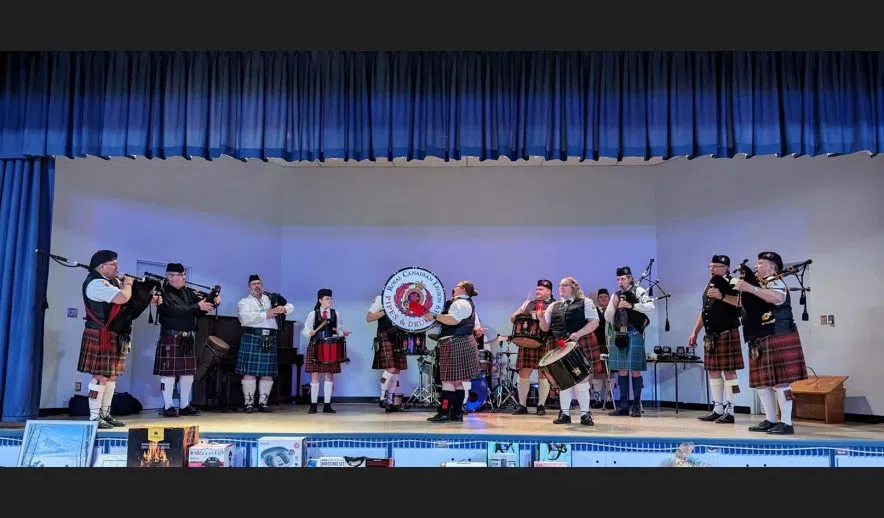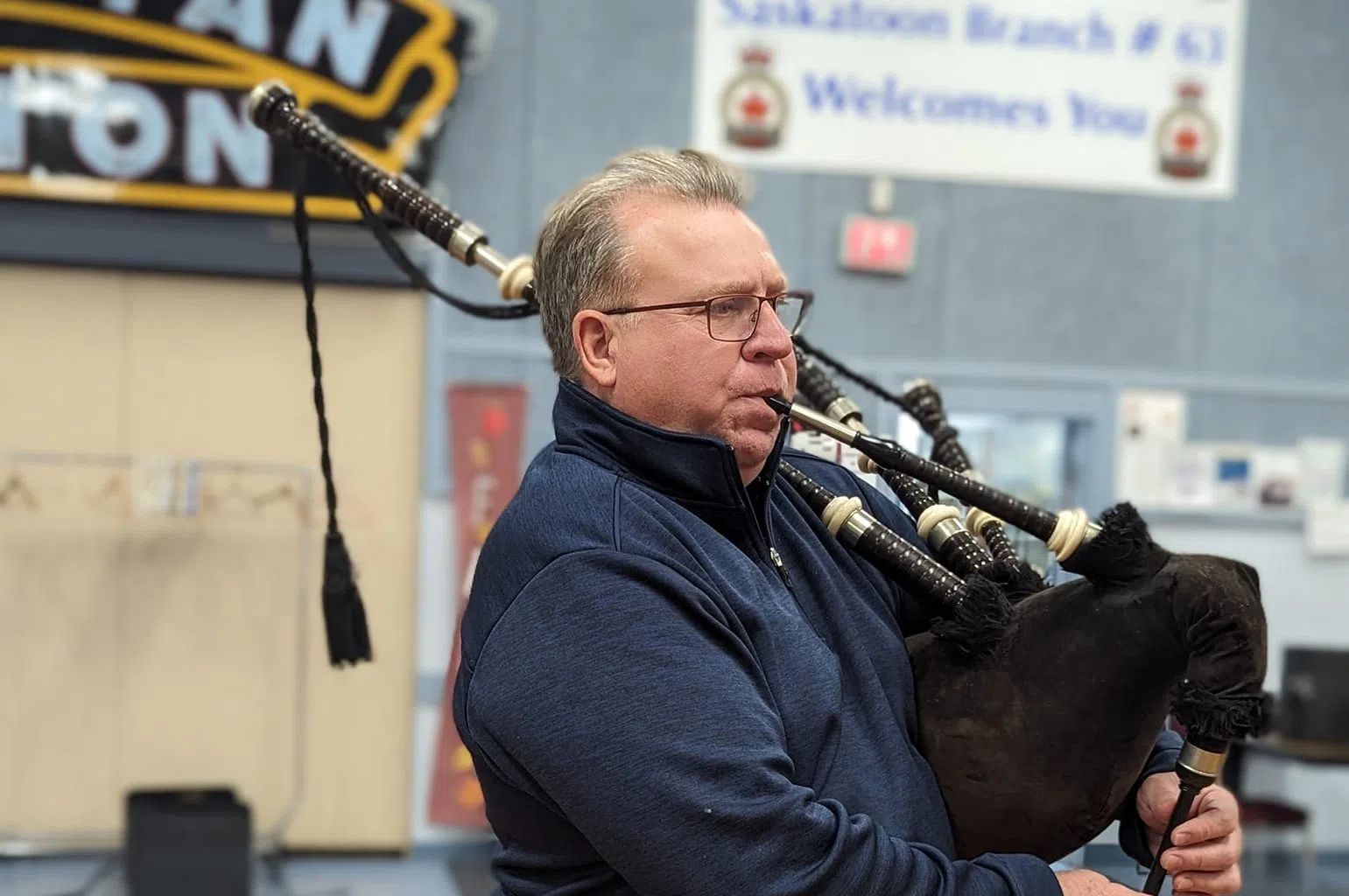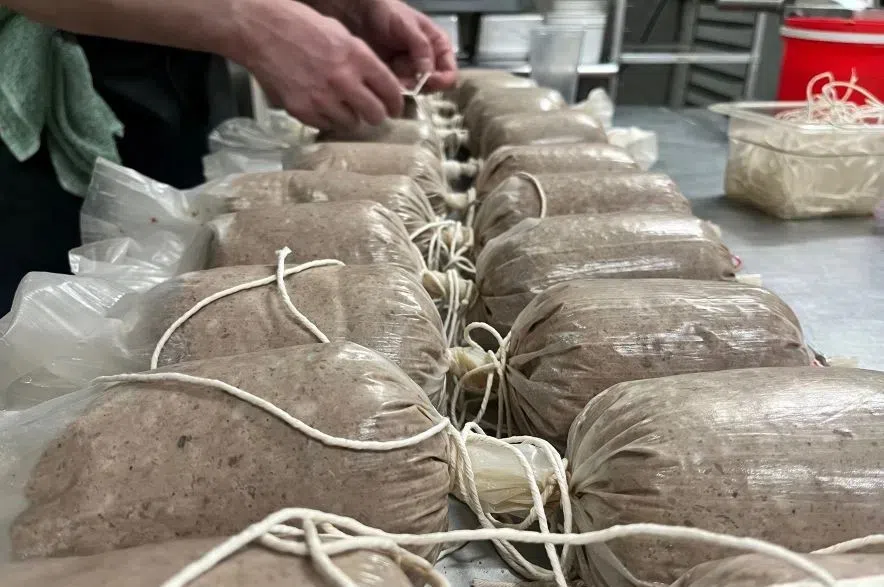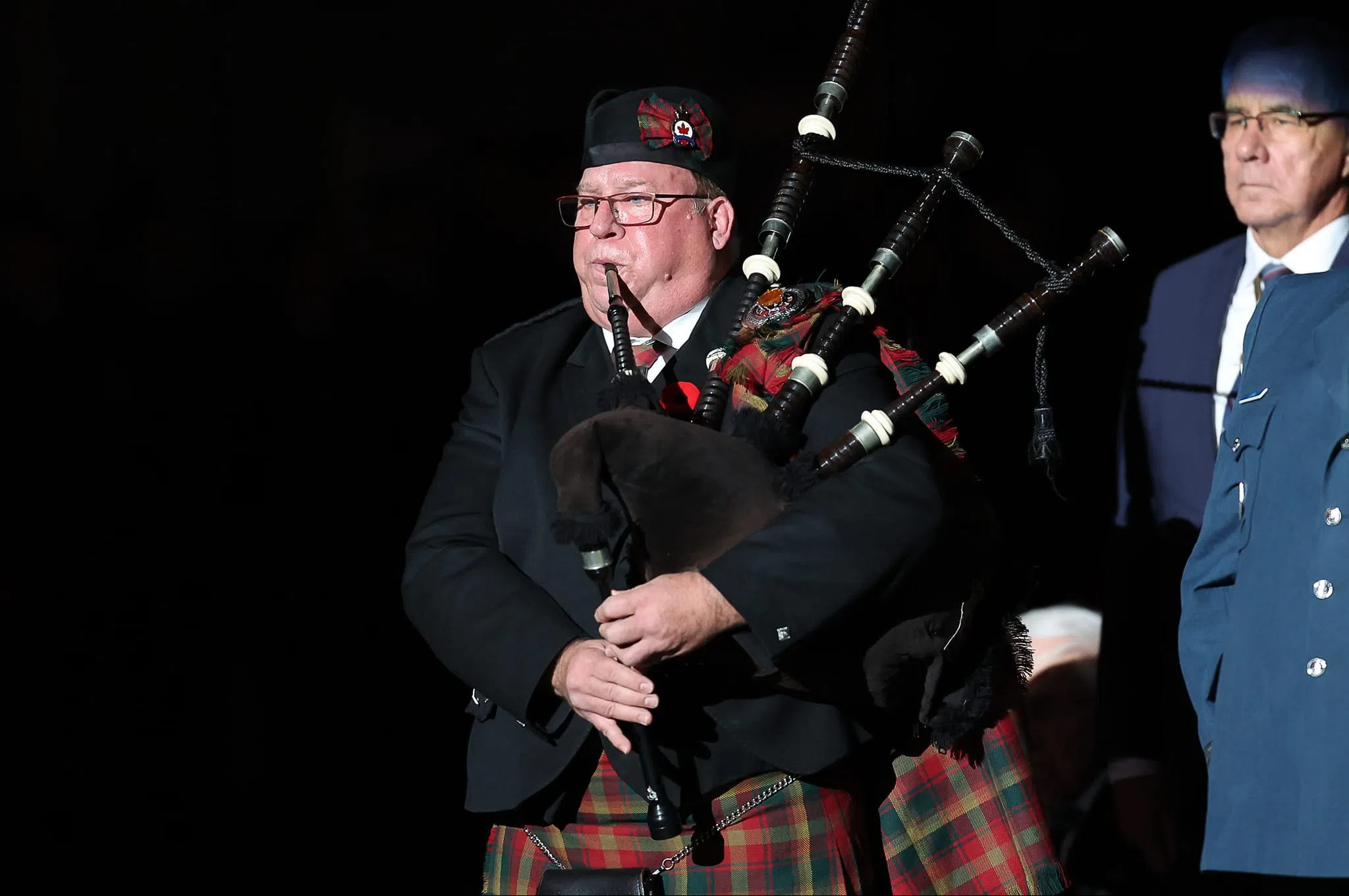Brad Fenty, a seasoned bagpiper and Pipe Major at the Royal Canadian Legion 63 Pipes and Drums Band in Saskatoon, is a central figure in organizing the highly anticipated Robbie Burns Scotch tasting fundraiser — one of the premier Robbie Burns Night events in Saskatoon.
A passionate advocate for Scottish traditions, Fenty seamlessly combines his musical talent with his deep-rooted Scottish heritage, helping to craft a memorable celebration of Scotland’s beloved national poet.
Ahead of the sold-out Robbie Burns Night event in Saskatoon, 650 CKOM sat down with Fenty to discuss the event’s significance, his personal connection to Scottish culture and what makes this annual celebration truly unforgettable.

Fenty admits that Scottish traditions like bagpipes and haggis can be an acquired taste, but said he genuinely enjoys both. (Brittany Caffet/650 CKOM)
_____________________________________________________________
650 CKOM: Can you tell us about your connection to Scotland?
BRAD FENTY: My Scottish roots go back to my great-grandfather, who emigrated from Scotland and worked as a stonemason. He contributed to several iconic buildings here in Saskatoon, including the Memorial Gates, (Royal) University Hospital, and the Thorvaldson Building. So, I have a personal and deep connection to Scottish heritage through my family.
What exactly is Robbie Burns Night and why is it so important to celebrate?
FENTY: Robbie Burns Night celebrates Scottish heritage, centred around Scotland’s national poet, Robert Burns. Burns is famous for his songs and poetry and his work is revered worldwide. The day is a chance to honour him, celebrate Scottish culture and enjoy traditional Scottish food, drink and music.

The Royal Canadian Legion 63 Pipes and Drums Band in Saskatoon will host their eighth annual Robbie Burns Scotch tasting fundraiser on Jan. 24. (Royal Canadian Legion 63 Pipes and Drums Band/Facebook)
How do you celebrate Robbie Burns Night in Saskatoon? What can people expect from the event?
Our Robbie Burns Night event in Saskatoon typically includes a formal dinner, we feature traditional Scottish dishes like haggis. One of the highlights is the “Address to a Haggis,” where we bring in the haggis, recite the poem and then enjoy the meal. There’s also plenty of music, with bagpiping and traditional songs, including “Auld Lang Syne.” This year, we have 180 attendees and the event is sold out, so it’s clear that people love to partake in this tradition!
Do you have to be of Scottish descent to participate in Robbie Burns Night?
Not at all! Robbie Burns Night is for everyone, regardless of heritage. It’s about celebrating Scottish culture and the universal themes of Burns’ work. The event welcomes all nationalities and is a wonderful opportunity for people to experience something new and connect with a rich cultural tradition.
Are there any Scottish traditions you’re particularly passionate about preserving?
I’m passionate about bagpiping and keeping that tradition alive. It’s such a big part of Scottish culture and something I’ve been dedicated to for years. A lot of people don’t know this, but Robbie Burns actually wrote more songs than poems in his lifetime and his music is a key part of his legacy. For me, the combination of piping and celebrating Burns’ work is the heart of the tradition.

Fenty said the annual Robbie Burns Night event is a fantastic opportunity to share his pride in his Scottish heritage. (Royal Canadian Legion 63 Pipes and Drums Band/Facebook)
What inspired you to start playing the bagpipes?
I was in my mid-thirties when I first started playing. I’d always admired Indigenous cultures and their pride in preserving their traditions and I realized I needed to feel that same pride for my Scottish heritage. I went to Folk Fest and saw the Highland Pipers play and it just clicked. I signed up to learn to play. Since then, I’ve played internationally, including in Scotland, China and Holland. It’s been an incredible journey.
There’s a common stereotype that bagpipes are a bit of an acquired taste. What’s your response to that?
Yeah, they can definitely be loud! In a small room, they might be overwhelming, but when they’re played outdoors, like by a lake or on a wide-open field, the sound is much more melodic. It’s a very spiritual instrument when played correctly, and I think a lot of people haven’t been exposed to that side of the bagpipes. Sure, they get a bit of a bad rap sometimes, but when played properly, they have a beautiful, rich tone. People just need to experience them in the right setting.
Let’s talk about the haggis. What are your thoughts on this iconic dish?
I actually really like haggis! It’s made from lamb and oats, with spices like cayenne pepper. Some people think it’s a bit off-putting because of the way it’s traditionally prepared in a sheep’s stomach, but that’s just the container. It’s like their Tupperware. The stomach isn’t actually eaten; it’s just used to carry the haggis. Honestly, it’s no more unusual than a hot dog. And once you try it, it’s delicious. Burns was a big fan of it, and that’s why he wrote the famous “Address to a Haggis.”

The Royal Canadian Legion 63 Pipes and Drums Band’s Robert Burns Scotch Tasting Night will feature haggis made locally by Saskatoon’s Pig and Pantry craft butchery. (Lara Fominoff/650 CKOM)
Can you tell us more about the “Address to a Haggis” and why it’s such an important part of the celebration?
“Address to a Haggis” is one of Burns’ most famous poems and it’s recited at the dinner before the haggis is served. Burns praises the haggis as the “Great Chieftain o’ the Puddin-race” and celebrates its power to nourish and strengthen those who eat it. The poem also humorously takes jabs at the English and the French. It’s a fun, lively piece and the ceremony of presenting and then cutting into the haggis is a big moment at the event. I know the entire poem in Gaelic and it’s always a highlight for me to recite.
How does it feel for you to bring a piece of your Scottish heritage to life here in Saskatchewan?
It’s incredibly fulfilling. I’m proud to be involved in preserving and sharing Scottish culture, just like how other communities here take pride in their traditions. It’s nice to feel that sense of belonging, and it’s even more special to see people from all walks of life embracing it.
The event is sold out this year, but will it be happening again next year?
Absolutely! Robbie Burns Day has become a tradition here, and we get people asking about tickets months in advance. It’s great to see such enthusiasm, and we’ll definitely be hosting it again next year.
Editor’s note: The answers in this interview have been edited and condensed for clarity.











